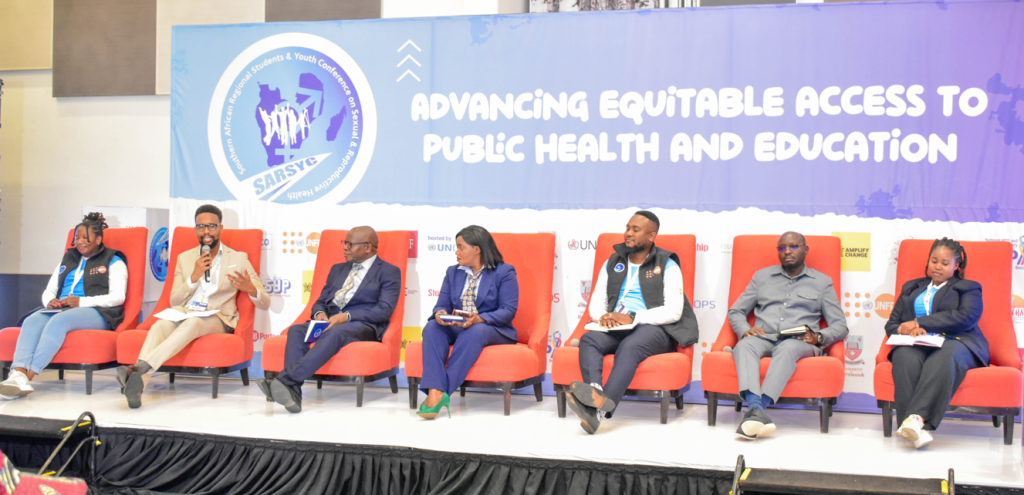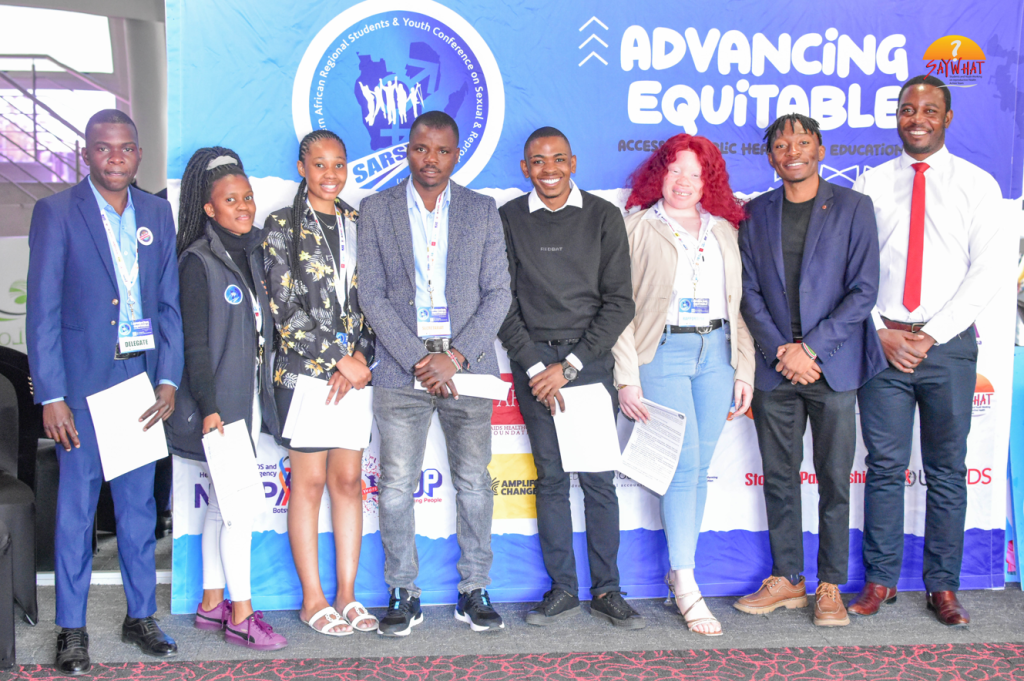
SARSYC V – Young People Develop Solutions for Quality Education in Southern Africa
Students And Youth Working on reproductive Health Action Team (SAYWHAT) in partnership with the University of Botswana successfully convened the 5th edition of the Southern African Regional Students and Youth Conference (SARSYC V) from 17th to the 19th of July 2024 in Gaborone, Botswana. Themed “Building Bridges, Navigating Emerging Issues: Advancing equitable access to public health and education” SARSYC V provided a platform for students and youth, policy makers, civil society organizations and development partners to reflect on progress in fostering development for young people as well as navigate the future of public health and education as we move towards 2030.
One of the key reflection action meetings during SARSYC V was the reflection action meeting on intersecting quality education, gender equality and public health to advance sustainable development goals – SDG3, 4 and 5. The Girls Education and Advocacy in the Region (GEAR) Alliance had the opportunity to facilitate a breakaway session and provide insights on education on gender equality during the reflection meeting setting the tone for a plenary session on the education progress index. Delegates from the Gender Dynamix, South Africa, UNESCO Zimbabwe, and students and college authorities from various universities in the Southern African region made diverse contributions on how we can make safe learning environments for young people and advance quality education. The discussions and issues raised in the breakaway session and the reflection action meeting contributed significantly to the development of the Gaborone Declaration of adopted at the end of the conference on the 19th of August 2024.
During the GEAR Alliance session, the discussion focused on enhancing the quality of education in Southern Africa, bolstering education systems, improving education financing, and exploring new trends and innovations in education. Young people emphasized the importance of improving access to education both physically and financially, particularly by constructing schools in remote areas and addressing poverty-induced barriers to education. Furthermore, they highlighted the necessity of creating safe learning environments with access to basic amenities such as clean water and essential healthcare products, including menstrual supplies.
Young people raised concerns about the methods used to measure the quality of education and the relevance of the region’s education curricula to its developmental needs. Many graduates in the region are struggling to find employment, prompting questions about the effectiveness of the current education system. They called for a more innovative approach to education that fosters technological advancements. Additionally, they highlighted the growing recognition of the potential for artificial intelligence to drive technological innovation in the region’s learning institutions.
Delegates underscored that the rights of the girl child are still being violated in most parts of Southern Africa, with child marriages persisting despite policies against the practice. This has resulted in numerous teenage pregnancies and many girls dropping out of school. Girls in marginalized communities are also facing period poverty, which is a significant reason for absenteeism from school. Delegates also stressed the importance of involving the boy child in efforts to support girls’ rights. Furthermore, the issue of students with disabilities was a central focus of the discussion, as it was noted that many schools lack disability-friendly education facilities.
Speaking at the conference, EOL Regional Programme Manager Richard OLONG bemoaned the possible removal of quality education from the successor framework to Sustainable Development Goals (SDGs) and encouraged young people to advocate its inclusion.
In the Gaborone Declaration which young people developed and handed to SADC PF Secretary General H.E. Ms Boemo Sekgoma, they acknowledged the SADC Regional Indicative Strategic Development Plan (RISDP) 2020-2030, SDGs on education, gender equality, and public health policies and interventions under SDG 4, SDG 5, and SDG 3, the UNESCO’s Education 2030 Framework for Action and the various programs and interventions by SADC countries and their development partners.
Young people called upon SADC Member States to:
-
- Take immediate action to push for the continuation of Education as a critical component of the Pact for the Future.
-
- Stop the removal of Education from the successor framework to SDGs.
-
- Allocate at least 20 % of the national budgets to education to ensure adequate, ring-fenced funding for targeted interventions to support marginalized learners in line with the Maputo Declaration
-
- Remove the tax burdens on all materials used to manufacture sanitary products to ensure sanitary wear is affordable and accessible for the most vulnerable girls, particularly those in rural and farming communities.

Young people urged Development Partners, Civil Society, and Other Stakeholders to engage parents, caregivers, and communities in education governance. They also called for the integration of low-cost, disability-friendly education technologies and efforts to address accessibility challenges. Additionally, they called for support of programs which prevent sexual harassment and gender-based violence in higher education institutions.


Leave a Reply